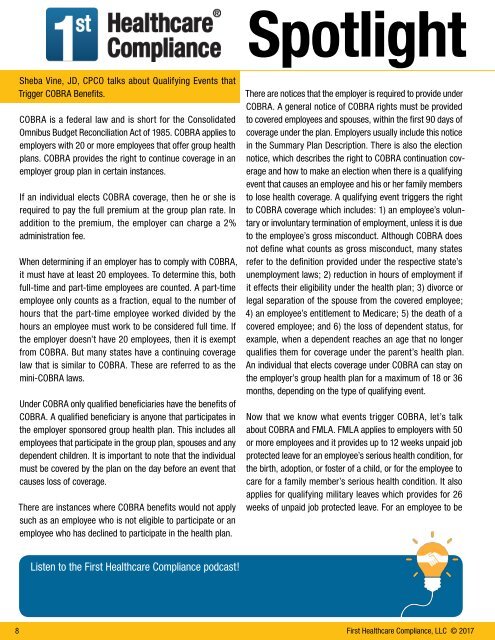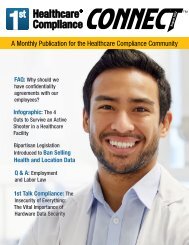First Healthcare Compliance CONNECT- December 2017
You also want an ePaper? Increase the reach of your titles
YUMPU automatically turns print PDFs into web optimized ePapers that Google loves.
Spotlight<br />
Sheba Vine, JD, CPCO talks about Qualifying Events that<br />
Trigger COBRA Benefits.<br />
COBRA is a federal law and is short for the Consolidated<br />
Omnibus Budget Reconciliation Act of 1985. COBRA applies to<br />
employers with 20 or more employees that offer group health<br />
plans. COBRA provides the right to continue coverage in an<br />
employer group plan in certain instances.<br />
If an individual elects COBRA coverage, then he or she is<br />
required to pay the full premium at the group plan rate. In<br />
addition to the premium, the employer can charge a 2%<br />
administration fee.<br />
When determining if an employer has to comply with COBRA,<br />
it must have at least 20 employees. To determine this, both<br />
full-time and part-time employees are counted. A part-time<br />
employee only counts as a fraction, equal to the number of<br />
hours that the part-time employee worked divided by the<br />
hours an employee must work to be considered full time. If<br />
the employer doesn’t have 20 employees, then it is exempt<br />
from COBRA. But many states have a continuing coverage<br />
law that is similar to COBRA. These are referred to as the<br />
mini-COBRA laws.<br />
Under COBRA only qualified beneficiaries have the benefits of<br />
COBRA. A qualified beneficiary is anyone that participates in<br />
the employer sponsored group health plan. This includes all<br />
employees that participate in the group plan, spouses and any<br />
dependent children. It is important to note that the individual<br />
must be covered by the plan on the day before an event that<br />
causes loss of coverage.<br />
There are instances where COBRA benefits would not apply<br />
such as an employee who is not eligible to participate or an<br />
employee who has declined to participate in the health plan.<br />
There are notices that the employer is required to provide under<br />
COBRA. A general notice of COBRA rights must be provided<br />
to covered employees and spouses, within the first 90 days of<br />
coverage under the plan. Employers usually include this notice<br />
in the Summary Plan Description. There is also the election<br />
notice, which describes the right to COBRA continuation coverage<br />
and how to make an election when there is a qualifying<br />
event that causes an employee and his or her family members<br />
to lose health coverage. A qualifying event triggers the right<br />
to COBRA coverage which includes: 1) an employee’s voluntary<br />
or involuntary termination of employment, unless it is due<br />
to the employee’s gross misconduct. Although COBRA does<br />
not define what counts as gross misconduct, many states<br />
refer to the definition provided under the respective state’s<br />
unemployment laws; 2) reduction in hours of employment if<br />
it effects their eligibility under the health plan; 3) divorce or<br />
legal separation of the spouse from the covered employee;<br />
4) an employee’s entitlement to Medicare; 5) the death of a<br />
covered employee; and 6) the loss of dependent status, for<br />
example, when a dependent reaches an age that no longer<br />
qualifies them for coverage under the parent’s health plan.<br />
An individual that elects coverage under COBRA can stay on<br />
the employer’s group health plan for a maximum of 18 or 36<br />
months, depending on the type of qualifying event.<br />
Now that we know what events trigger COBRA, let’s talk<br />
about COBRA and FMLA. FMLA applies to employers with 50<br />
or more employees and it provides up to 12 weeks unpaid job<br />
protected leave for an employee’s serious health condition, for<br />
the birth, adoption, or foster of a child, or for the employee to<br />
care for a family member’s serious health condition. It also<br />
applies for qualifying military leaves which provides for 26<br />
weeks of unpaid job protected leave. For an employee to be<br />
Listen to the <strong>First</strong> <strong>Healthcare</strong> <strong>Compliance</strong> podcast!<br />
8<br />
<strong>First</strong> <strong>Healthcare</strong> <strong>Compliance</strong>, LLC © <strong>2017</strong>


















